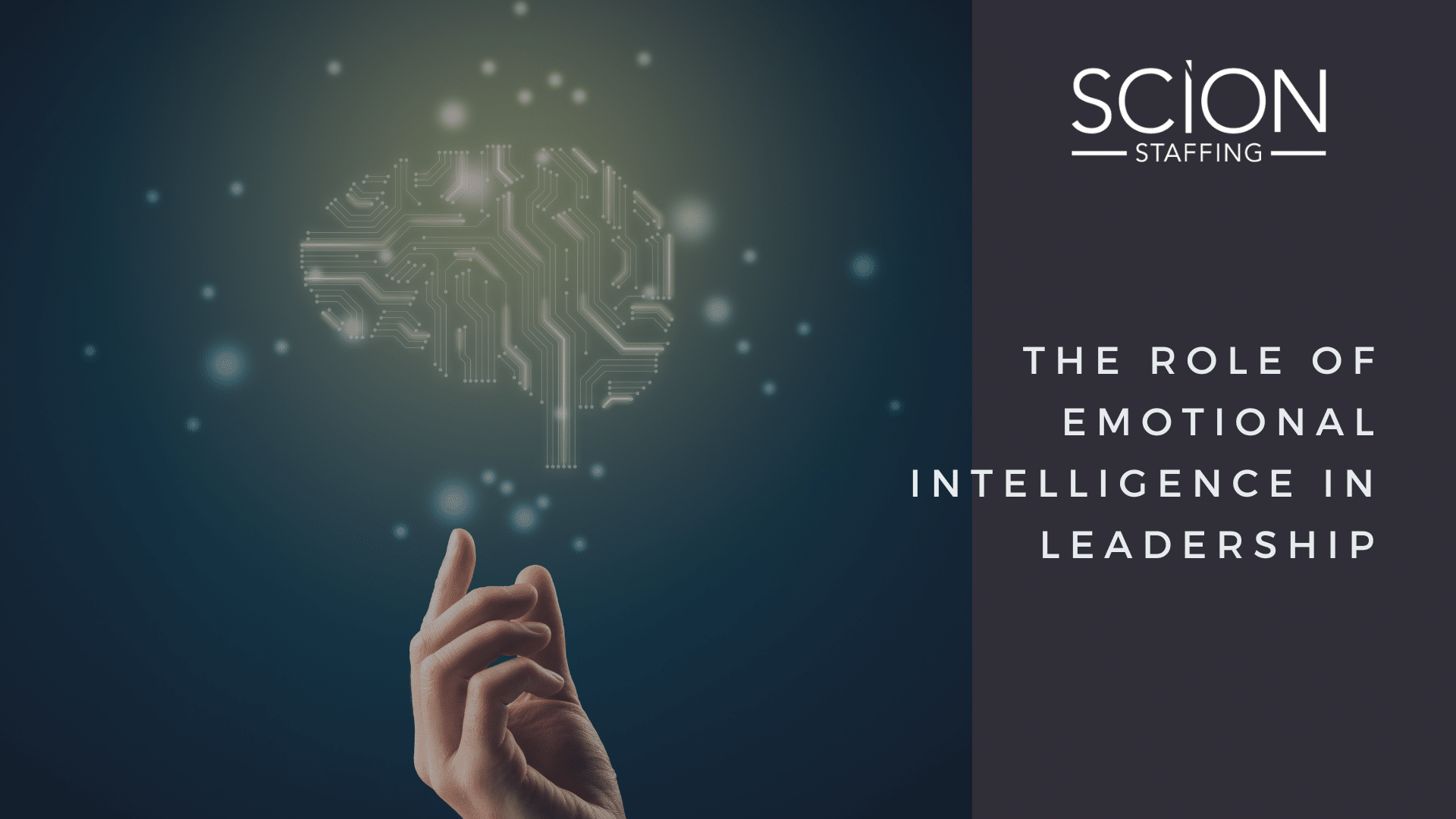
04 Nov The Role of Emotional Intelligence in Leadership
In today’s ever-evolving business landscape, leaders are constantly faced with the challenge of managing not just tasks and projects, but also the people who bring these projects to life. “Emotional intelligence” is a term that’s been thrown around a lot, yet it’s critical to comprehend why it’s more than just a buzzword. Emotional intelligence, also known as EQ or EI, is the ability to understand and manage your own emotions, as well as those of the people around you. With research indicating that EI can account for up to 58% of performance in various job roles, it’s a skill that leaders can’t afford to overlook.
Join us for our latest article where we will discover the importance of emotional intelligence in leadership roles, the core components of emotional intelligence, and how prioritizing these skills can help create better leaders for your organization!
What is Emotional Intelligence?
Emotional Intelligence is the ability to understand, use, and manage your own emotions in positive ways. It also involves understanding the emotions of others, responding to them with empathy, and effectively handling interpersonal relationships.
Why is Emotional Intelligence Important for Leaders?
Leaders with high EQ are better equipped to navigate the complexities of the workplace. They can build strong teams, make sound decisions, inspire and motivate others, adapt to change, and handle stress effectively.
The Core Components of Emotional Intelligence:
- Self-Awareness: This is about understanding your own emotions, strengths, weaknesses, and their impact on others. Leaders who are self-aware are better at managing their teams because they can gauge how their actions affect team morale and productivity.
- Self-Regulation: Leaders with strong self-regulation can control their impulses and moods. This doesn’t mean suppressing emotions, but rather managing them effectively so they don’t hinder decision-making or interactions.
- Motivation: Beyond external incentives, leaders with high emotional intelligence are intrinsically motivated. They set personal goals and are driven by an innate need to achieve them, thereby inspiring and motivating their teams.
- Empathy: Empathy is the ability to understand and share the feelings of others. It goes beyond sympathy, involving active listening and perspective-taking that builds stronger relationships and fosters trust.
- Social Skills: These are the skills needed for effective communication and relationship-building. Leaders with strong social skills manage teams more effectively, resolve conflicts, and are adept at change management.
By understanding and developing these aspects of emotional intelligence, leaders can significantly enhance their effectiveness and achieve greater success.
Key Benefits of Strong Emotional Intelligence in Leadership
Effective leadership is more than just technical skills and strategic thinking. Emotional intelligence has emerged as a critical factor in determining a leader’s success. By understanding and managing emotions, both their own and those of others, leaders can build stronger teams, make better decisions, and inspire their organizations to achieve great things. In this section, we’ll take a deeper look at the key benefits of having strong emotional intelligence as a leader.
Building Strong Relationships
Leaders with high EQ can build strong, trusting relationships with their team members, clients, and stakeholders. By actively listening, empathizing, and communicating effectively, they create a positive and collaborative work environment.
Making Informed Decisions
EQ enables leaders to make more informed decisions by considering both logical and emotional factors. By understanding their own biases and the emotions of others, they can avoid impulsive decisions and make choices that are aligned with their long-term goals.
Inspiring and Motivating Others
Leaders with high EQ can inspire and motivate their teams by connecting with them on an emotional level. By recognizing and appreciating their contributions, providing constructive feedback, and offering support, they can create a culture of engagement and productivity.
Adapting to Change
EQ helps leaders navigate uncertainty and embrace change with resilience and optimism. By understanding their own emotions and the emotions of others, they can adapt to new situations and challenges with flexibility and creativity.
Managing Stress and Pressure
Leaders with high EQ can manage stress and pressure more effectively by regulating their own emotions and the emotions of their team members. By practicing mindfulness and stress-management techniques, they can maintain a calm and focused demeanor, even in the most challenging situations.
Developing Your Emotional Intelligence
Developing emotional intelligence is a journey that requires self-awareness, self-regulation, empathy, and social skills. By practicing and prioritizing these skills, you can enhance your leadership abilities and build stronger relationships.
Self-Awareness
To develop self-awareness, it’s important to reflect on your emotions and how they impact your behavior. Consider journaling or mindfulness meditation to gain deeper insights into your thoughts and feelings. Additionally, seeking feedback from trusted colleagues or friends can provide valuable perspectives on your strengths and weaknesses.
Self-Regulation
Self-regulation involves managing your emotions effectively. To improve your self-regulation skills, practice stress-management techniques such as deep breathing, meditation, or yoga. When faced with challenging situations, take a moment to pause and consider your response before reacting impulsively. Patience is also a valuable skill to develop, as it allows you to respond calmly and thoughtfully.
Empathy
Empathy is the ability to understand and share the feelings of others. To develop empathy, practice active listening, paying attention to both verbal and nonverbal cues. Try to see situations from another person’s perspective and consider their feelings. Volunteering or engaging in community service can also help you develop empathy by connecting with people from different backgrounds.
Social Skills
Strong social skills are essential for effective leadership. To improve your social skills, focus on clear and concise communication, both verbally and non-verbally. Additionally, learn effective strategies for resolving conflicts peacefully and building strong relationships with colleagues and clients. By investing time in building positive relationships, you can create a more supportive and productive work environment.
Other Ways to Develop and Gauge Emotional Intelligence
Beyond self-guided practices, there are other structured methods available that can help enhance your emotional intelligence and assess it on your journey into leadership.
Coaching and Mentoring
Working closely with a coach or mentor can provide personalized guidance and feedback on your emotional intelligence. They can help you identify strengths, weaknesses, and areas for improvement.
Leadership Development Programs
Enrolling in leadership development programs can offer a structured approach to developing your EQ. These programs often include workshops, exercises, and assessments designed to enhance self-awareness, self-regulation, empathy, and social skills.
Emotional Intelligence Assessments
Taking an emotional intelligence assessment can provide valuable insights into your strengths and weaknesses. These assessments can help you identify areas where you may need to focus your development efforts.
Self-Reflection
Regularly reflecting on your thoughts, feelings, and behaviors is a powerful tool for self-awareness. Journaling, meditation, and mindfulness practices can help you gain deeper insights into your emotional patterns. Reading books, articles, and blogs on emotional intelligence can also provide valuable knowledge and inspiration.
Looking for Candidates with High Emotional Intelligence? Scion Staffing Can Help!
Emotional intelligence remains a pivotal skill in effective leadership, offering benefits like improved decision-making, stronger team performance, and increased job satisfaction. By understanding and developing your emotional intelligence, you can elevate your leadership style and foster a positive and productive work environment. At Scion Staffing, we understand the importance of this quality in leaders and are dedicated to helping businesses find candidates who excel in emotional intelligence. Connect with us to explore how we can assist you in recruiting top-tier talent that embodies the qualities of an emotionally intelligent leader.
About the Author
Patrick Chiotti (he/him) is an accomplished SEO writer and is currently the Marketing and Communications Specialist at Scion Staffing, bringing years of experience in SEO knowledge and a passion for writing to the Scion team. With additional experience in customer service roles, retail, and accounting, Patrick brings a unique set of knowledge and skills to his role while sharing the passion to continue learning about a wide range of topics so he can share his voice to a larger audience. Outside of Scion, Patrick spends his time as a football coach at the high school level and is passionate about teaching the game, while remaining a student to it. He is also a husband and father, and enjoys fitness, as well as a passion for cooking amazing food.



